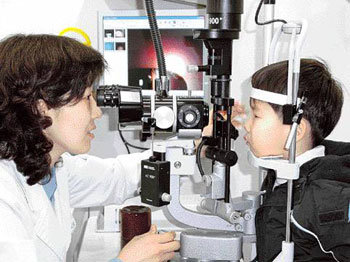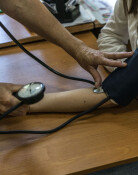A Medical Checklist for Children

What if my child is alienated by his peers? What if he has trouble adjusting to school life? What if he has health problems? These are list of worries of parents who are about to send their kids to school. Although more and more children experience school life through nurseries and kindergartens, elementary school means real classes and more stringent rules, which can be stressful for children. In order to ensure children to get adjusted to school life well, parents should take their children to a hospital for medical check ups to check their physical and mental health.
Basic check up: eyes, nose, teeth-
Schoolchildren are likely to read books and use computers longer after school starts than before. Longer looks at books and screens can cause troubles in the crystalline lens, which can lead to tired eyes. If it gets worse, it can lead to pseudomyopia, myopia, and strabismus.
Pediatrician Choi Dong-kyu at Kangnam Sacred Heart hospital said, Generally children around age 4 should see an eye doctor to check vision. If its not possible, it should be done at least before entering school.
If your child frowns when watching TV, he or she might be myopic. Children with hyperopia experience tired eyes often because they experience blurry near vision, which causes trouble reading books even though they can see blackboards pretty well. When your childs corrected visual acuity with glasses is 20/25 or worse (amblyopia), medical care is needed. Medical treatment is particularly effective when started before age 6.
One can develop strabismus or amblyopia in one eye. In this case, one does not realize anything is wrong because he or she can depend on the other eye for good vision. To prevent this defect from getting worse, one should see an eye doctor and start wearing glasses.
Two or three percent of children have strabismus. When a child shows a crooked eye once in a while when he is tired or sick, we call it intermittent heterotropia, which is hardly noticeable by parents, so eye checkups are critical.
Teeth care is important too. Elementary school years are when baby teeth are usually lost and replaced by permanent teeth. At that time, kids eat candies a lot, thus making it easier to develop cavities. When teeth are not aligned well, a child may feel inferior. When a permanent tooth grows before a deciduous tooth is lost, one should go to the dentist to pull it out.
If your kid frequently picks his nose or snuffles, he might have rhinitis or sinusitis. A snoring kid feels tired even after waking up and has concentration problems, which are not helpful for study.
You should also check vaccines and if necessary, have your kid inoculated. Vaccines for the measles, mumps, and MMP are also on parent must-do lists.
Check it whether it is temporary stress from school or mental disorder-
Some children wet their beds, bite their nails, or show abnormal behaviors before entering school. Stress is to blame and you should encourage your child to have confidence.
You can help your kids by practicing talking in front of people or to write a diary to mitigate stress effectively. Appropriate levels of exercise can help too.
Your child may need to see a pediatric psychiatrist if he or she is hostile to peers, shows slow language development, is very distracted and not concentrating, shows a lack of ability to understand and judge, or worries too much about being away from his mother.
Separation anxiety disorder appears when a child starts to go to school. You can help your child by practicing with him to read books and eating lunch at a specific time just like at school or taking him to the school and looking around the classrooms and playground weeks before school starts.
If your kid is easily distracted and has concentration problems, he may have ADHD. ADHD affects 3 to 5 percent of school age children and is easily treatable when diagnosed in early its stages.
If your child has language development disorder, he should be tested whether he has brain disorder. If it is just a pronunciation problem, no reason to worry about it, but if it is brain disorder, you may consider special education for him. One should be tested for learning disabilities. In most cases, your child seems to be slow because you expect too much, but in some cases, he may have a cognitive disability.
(References: Child and Adolescent Psychiatrics Professor Jeong Yoo-suk at Samsung Medical Center and Pediatric Dentistry Professor Oh So-hee at Hallym University Sacred Heart Hospital.)
artemes@donga.com







